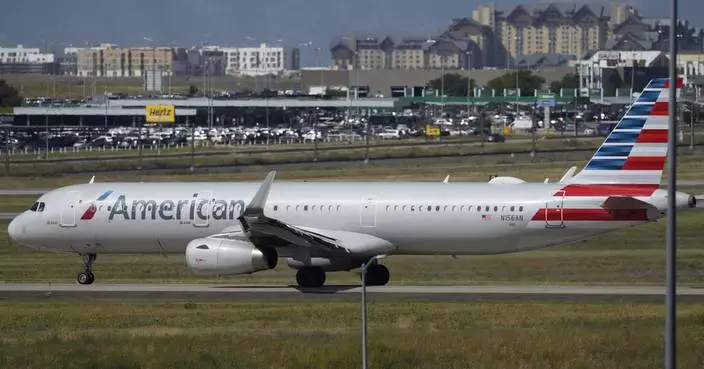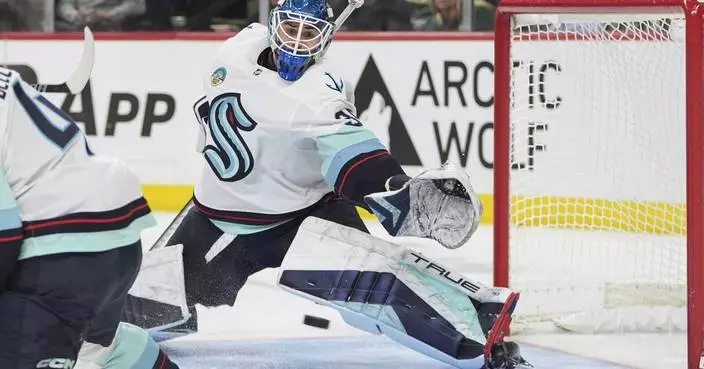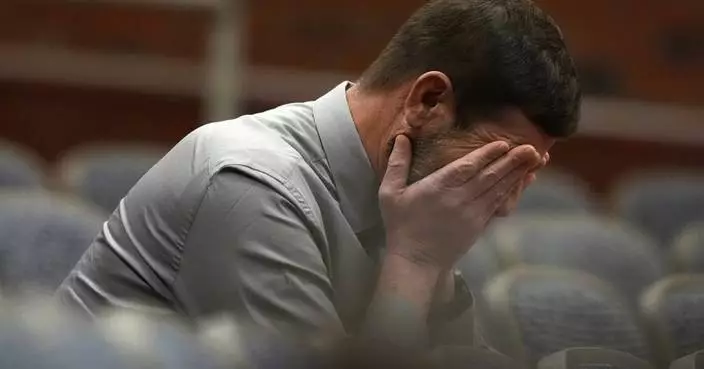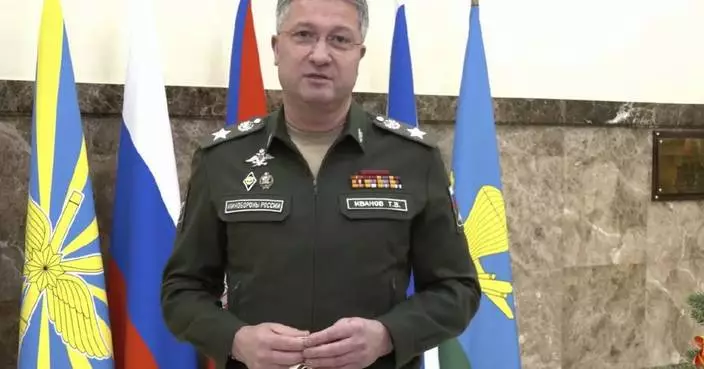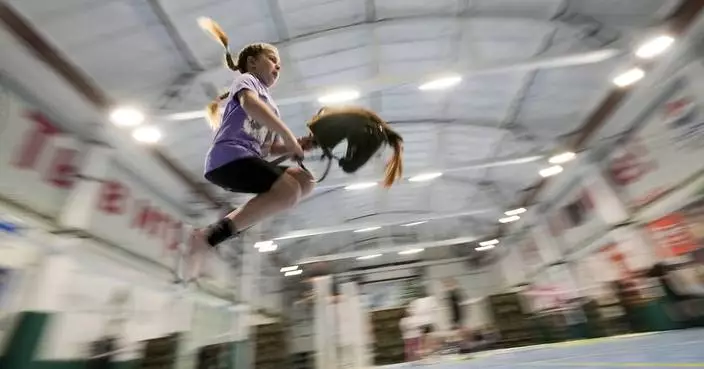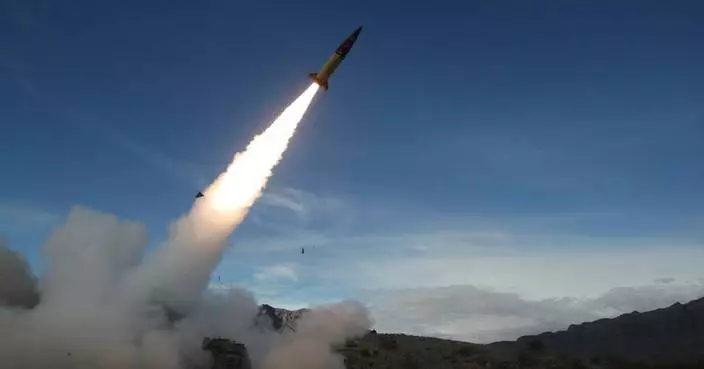The missile used to shoot down a Malaysia Airlines passenger jet over eastern Ukraine in 2014, killing all 298 aboard, belonged to a Russia-based military unit, an international team of investigators said Thursday after painstakingly studying video and photos of a military convoy.
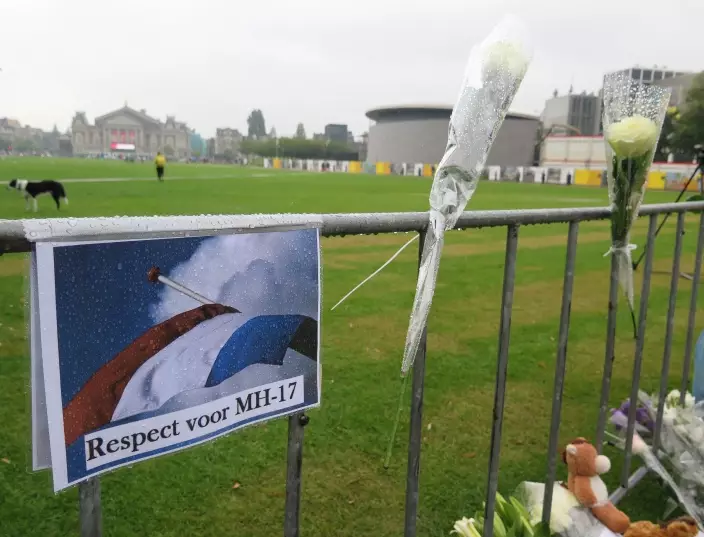
FILE - In this Monday, July 21, 2014 file photo, a sign reading: Respect for MH17, during a commemoration at Museum Square in Amsterdam. (AP Photo/Margriet Faber, File)
The criminal investigation team "has concluded that the Buk Telar with which Flight MH17 was shot down is from the 53rd anti-aircraft missile brigade from Kursk in the Russian Federation," said Wilbert Paulissen, head of the Netherlands' National Crime Squad, referring to the missile system used.
Click to Gallery
The missile used to shoot down a Malaysia Airlines passenger jet over eastern Ukraine in 2014, killing all 298 aboard, belonged to a Russia-based military unit, an international team of investigators said Thursday after painstakingly studying video and photos of a military convoy.
The criminal investigation team "has concluded that the Buk Telar with which Flight MH17 was shot down is from the 53rd anti-aircraft missile brigade from Kursk in the Russian Federation," said Wilbert Paulissen, head of the Netherlands' National Crime Squad, referring to the missile system used.
On Thursday, Russia criticized the Joint Investigation Team, or JIT, for relying on claims by Bellingcat.
Prosecutor Fred Westerbeke said the new conclusion raised new questions, "such as the question about how actively involved the brigade itself was in bringing down Flight MH17."
Investigators displayed parts of the engine casing and exhaust system of a Buk 9M38 series missile recovered from eastern Ukraine and showed photos of its serial number, which they said demonstrated it was made in Moscow.
It was the clearest link yet published by the investigators to the involvement of Russian military in the deadly surface-to-air missile strike on the Boeing 777, and it echoed findings published in 2016 by the Bellingcat investigative group.
Russia has always denied involvement in the downing of Flight 17, which was en route from Amsterdam to Kuala Lumpur, Malaysia, when it was blown out of the sky at 33,000 feet (about 10,000 meters) over war-ravaged eastern Ukraine on July 17, 2014.
Bodies, debris and burning wreckage were strewn over a field of sunflowers near the rebel-held village of Hrabove in the Donetsk region of eastern Ukraine, about 40 kilometers (25 miles) from the Russian border, where fighting had been raging for months.
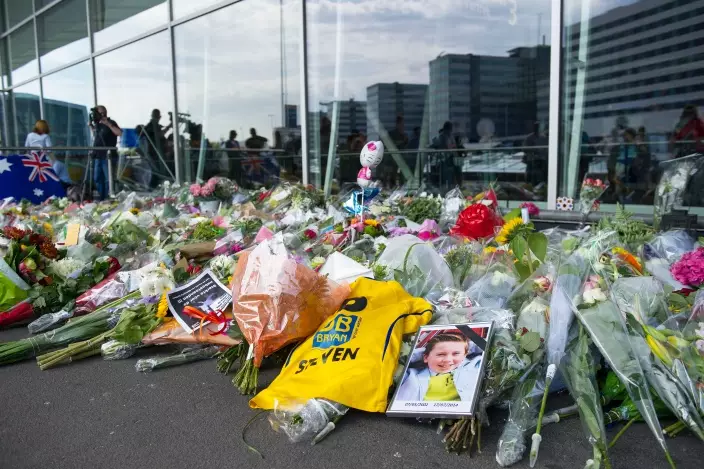
FILE - In this Sunday, July 20, 2014 file photo, a photo of Steven Noreilde from Brasschaat, Belgium, a victim of flight MH17, lays next to a soccer shirt surrounded by flowers, at Schiphol airport in Amsterdam. (AP Photo/Patrick Post, File)
On Thursday, Russia criticized the Joint Investigation Team, or JIT, for relying on claims by Bellingcat.
"If the international investigative team is indeed interested in tracking down the real culprits of the MH17 catastrophe, its members would better rely on facts and witness testimony and not fakes produced by Bellingcat and Ukraine's Security Service," the Russian Defense Ministry said in a statement.
The Russian Foreign Ministry also criticized the investigators for allegedly ignoring evidence provided by Russia, including radar surveillance of the airspace at the time of the flight.
"In these circumstances, we have legitimate questions about the true underlying cause of the decision of the JIT to disclose the preliminary conclusion," the Foreign Ministry statement said.
Prosecutors said they have presented their findings to Moscow and are seeking answers, but so far have not received a response. The international team running the criminal investigation appealed for help from witnesses who can testify about the involvement of the Russian military's 53rd anti-aircraft missile brigade.
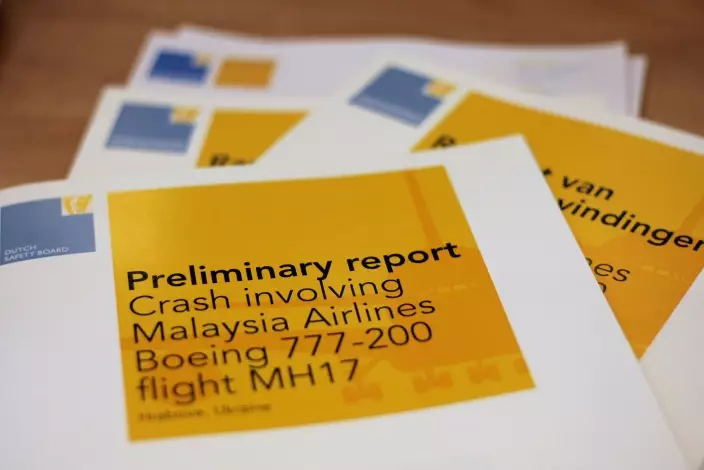
FILE - In this Tuesday, Sept 9, 2014 file photo, a stack of preliminary reports by the Dutch Safety Board on the crash of Malaysia Airlines flight MH17 is displayed at the board's headquarters in The Hague, Netherlands. (AP Photo/Mike Corder, File)
Prosecutor Fred Westerbeke said the new conclusion raised new questions, "such as the question about how actively involved the brigade itself was in bringing down Flight MH17."
Westerbeke said the JIT is not yet ready to identify suspects, but added: "I can say that we are now entering the ... last phase of the investigation."
Prosecutors said in 2016 that the plane was shot down by a Buk 9M38 missile fired from territory controlled by Russia-backed rebels, using a mobile launcher trucked in from Russia and hastily returned there.
Thursday's presentation went a step further by identifying the exact unit allegedly involved in the transport. It showed a compilation of video and photos from social media tracing the missile brigade convoy's journey in the weeks before the incident.
"All findings from this forensic investigation confirm the earlier conclusion of the JIT that Flight MH17 was shot down by 9M38 series missile," said Jennifer Hurst of the Australian Federal Police.
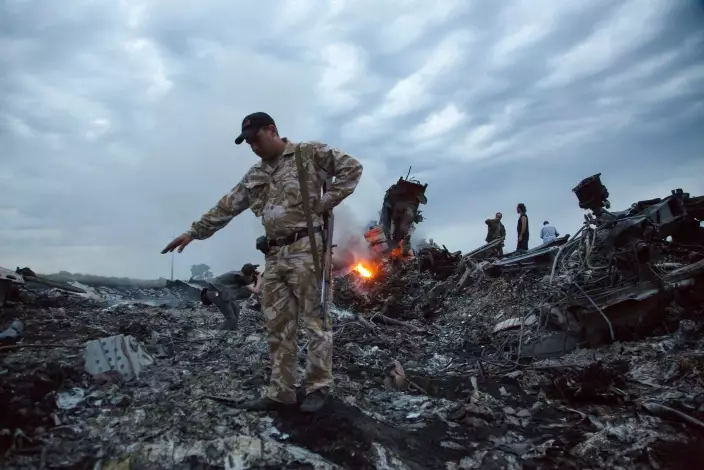
FILE - In this July 17, 2014. file photo, people walk amongst the debris at the crash site of a passenger plane near the village of Grabovo, Ukraine. (AP Photo/Dmitry Lovetsky, File)
Investigators displayed parts of the engine casing and exhaust system of a Buk 9M38 series missile recovered from eastern Ukraine and showed photos of its serial number, which they said demonstrated it was made in Moscow.
However, investigators said they could not yet say with certainty that it was the exact missile used to down MH17. They appealed for witnesses to come forward with more information about the missile and the role of the Russian military in transporting it.
In a statement, Australian Foreign Minister Julie Bishop said: "That a sophisticated weapon belonging to the Russian Army was dispatched and used to shoot down a civilian aircraft should be of grave international concern. We are discussing these findings with our partners and considering our options."
Ultimately, any suspects identified and charged will be prosecuted in Dutch courts — if they can be arrested and brought to trial.
Of the 298 people killed, 196 were Dutch, 42 were Malaysian and 27 were Australian.
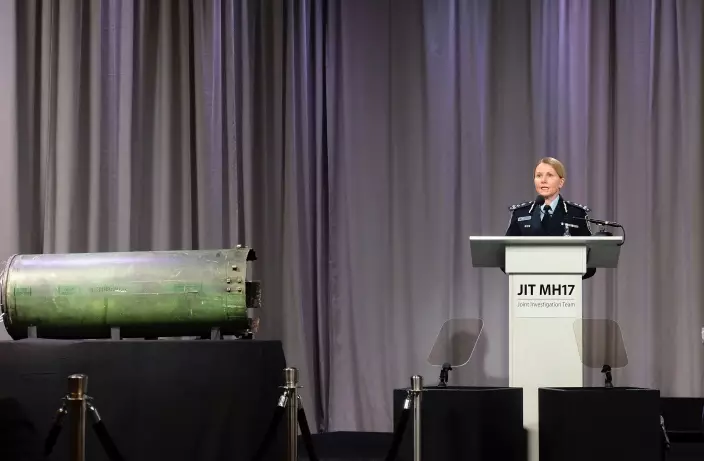
Australian Federal Police Commander Jennifer Hurst speaks as she stands near to part of a Buk missile recovered from the site of the MH17 crash, during a press conference regarding the downing of the Malaysia Airlines Flight 17, in Bunnik, Central Netherlands, Thursday, May 24, 2018. (AP Photo/Michael Corder)
Ukrainian President Petro Poroshenko said in a Facebook post that he would "do everything possible to ensure that the actions of the Russian Federation as a state which supports terrorism get an appropriate assessment" in the International Court of Justice.
Dutch Prime Minister Mark Rutte cut short a visit to India so he could chair a Cabinet meeting to discuss the findings.
Piet Ploeg, a member of a foundation for victims' relatives, said the Dutch government should not consider legal steps against Russia.
Belgian Foreign Minister Didier Reynders urged all countries to cooperate fully with the investigation "so that those responsible can be brought to justice."
WASHINGTON (AP) — The U.S. Supreme Court on Thursday took up Donald Trump's bid to avoid prosecution over his efforts to overturn his 2020 election loss to Democrat Joe Biden.
Trump’s lawyers argue that former presidents are entitled to absolute immunity for their official acts. Otherwise, they say, politically motivated prosecutions of former occupants of the Oval Office would become routine and presidents couldn’t function as the commander in chief if they had to worry about criminal charges.
Lower courts have rejected those arguments, including a unanimous three-judge panel on an appeals court in Washington. And even if the high court resoundingly follows suit, the timing of its decision may be as important as the outcome.
That’s because Trump, the presumptive 2024 Republican presidential nominee, has been pushing to delay the trial until after the November election, and the later the justices issue their decision, the more likely he is to succeed.
The court typically issues its last opinions by the end of June, which is roughly four months before the election.
Currently:
— What to listen for during Supreme Court arguments on Donald Trump and presidential immunity
— The Supreme Court will decide whether Trump is immune from federal prosecution. Here’s what’s next
— What to know in the Supreme Court case about immunity for former President Trump
— Trump is in New York for the hush money trial while the Supreme Court hears his immunity case in DC
— Follow the AP’s coverage of the U.S. Supreme Court at https://apnews.com/hub/us-supreme-court
Here's the latest:
Arguments before the U.S. Supreme Court have ended after more than 2 1/2 hours in Donald Trump’s bid to avoid prosecution over his efforts to overturn his 2020 election loss to Joe Biden.
The arguments had been scheduled to last for an hour but ran more than double the allotted time.
The case delved deep into the nuances of immunity, and key questions of when the high court might rule remain unclear.
The court usually releases its opinions by the end of June, and the timing of the ruling could be as important as the outcome.
At least five justices appeared likely to reject the claim of absolute immunity, but some also suggested that former presidents might have some immunity.
If their ruling reflects that and requires lower courts to then sort out whether immunity applies to Trump, it could push the trial past the November election.
The Supreme Court justices are keenly aware their decision on whether former commanders in chief have immunity will have huge implications not just for this case, but also far beyond this prosecution.
During arguments Thursday in Donald Trump’s bid to avoid prosecution over his efforts to overturn his 2020 election loss, Justice Neil Gorsuch told special counsel team lawyer Michael Dreeben they are “writing a rule for the ages.”
Justice Brett Kavanaugh concurred, adding: “This case has huge implications for the presidency, for the future of the presidency, for the future of the country.”
Dreeben is working hard throughout the arguments to make clear that a prosecution in this case would not open the floodgates to other criminal charges against future ex-presidents.
In response to a question about drone strikes authorized by former President Barack Obama, Dreeben said the U.S. government already analyzed that fact pattern and concluded that there was “no risk of prosecution for that course of activity.”
As Supreme Court arguments over immunity for Donald Trump stretched near the two-hour mark Thursday, special counsel team attorney Michael Dreeben got to the heart of the government’s case.
He ticked through the acts Trump is charged with, including a slate to elevate fake electors in battleground states, that he said were undertaken in Trump’s status as a presidential candidate and not a president.
Dreeben did, however, note that Trump’s interactions with Justice Department officials in his administration were perhaps protected acts.
The justices appeared highly skeptical of Trump’s claims of absolute immunity, but with arguments still underway, the essential question of when they might decide the case remains unclear.
The timing of their ruling could be as important as the outcome. At least five justices appeared likely to reject the claim of absolute immunity, but some also suggested that former presidents might have some immunity.
If their ruling reflects that and requires lower courts to then sort out whether immunity applies to Trump, it could push the trial past the November election. The court usually releases opinions by the end of June.
In oral arguments that have involved a lot of elevated legal jargon, the Supreme Court justices also sneaked in a few fun metaphors Thursday during Donald Trump’s bid to avoid prosecution over his efforts to overturn his 2020 election loss to Joe Biden.
Striking a skeptical note while questioning Trump lawyer D. John Sauer, Chief Justice John Roberts argued that expunging from the indictment acts that are official rather than personal would hobble the case, making it a “one-legged stool.”
Later, in conversation with special counsel team lawyer Michael Dreeben, Justice Samuel Alito brought up “the old saw about indicting a ham sandwich.” He was referring to the belief that indictments are easy to secure, and that they don’t necessarily indicate any likelihood of guilt.
Alito asked Dreeben whether he had come across a lot of cases in which a federal prosecutor wanted to indict a case and the grand jury refused. Dreeben said there are such cases, before Alito cut him off.
“Every once in a while there’s an eclipse, too,” Alito said, drawing some laughs in the courtroom.
The team under Special Counsel Jack Smith, which wrote that a lack of previous criminal charges “underscores the unprecedented nature” of what Donald Trump is accused of, is up before the Supreme Court in Trump's bid to avoid prosecution over his efforts to overturn his 2020 election loss to Democrat Joe Biden.
Michael Dreeben, a lawyer for the Smith team, said the court has never before recognized absolute immunity for a former president. “Such presidential immunity,” he said, “has no foundation in the Constitution.”
Justice Clarence Thomas asked Dreeben whether he was saying that there was no immunity even for official acts.
Dreeben said yes and also that impeachment and conviction before the Senate is not a prerequisite for a courtroom prosecution. Dreeben said there are plenty of checks to prevent politically motivated prosecutions.
Thomas said that other presidential acts in the past would have seemed ripe for prosecution and yet none occurred. Dreeben responded that the core distinction is that those other acts were not crimes.
Dreeben said the Smith team was not endorsing a system in which presidents would be exposed to prosecution for mistakes or bad judgments.
Justice Neil Gorsuch posed a line of questions Thursday that appeared friendly to arguments by Trump's lawyers in his bid to avoid prosecution over his efforts to overturn his 2020 election loss to Democrat Joe Biden.
Gorsuch suggested that if presidents fear they could be prosecuted after they leave office, they could begin preemptively pardoning themselves.
“We’ve never answered whether a president can do that. And happily, it’s never been presented to us,” he said.
But Justice Amy Coney Barrett took issue with a key argument of the Trump team — that under the Constitution, former presidents must be impeached and convicted before the Senate before they can be prosecuted in court.
Barrett said no one has ever suggested the justices would need to be impeached and convicted before they could be prosecuted. Trump lawyer D. John Sauer responded that under the Constitution, the sequence is only mandatory as it relates to former presidents.
Some Supreme Court justices posed scenarios or expressed skepticism Thursday as arguments started in Donald Trump’s bid to avoid prosecution over his efforts to overturn his 2020 election loss to Democrat Joe Biden.
Conservative Justice Samuel Alito said he considered it “implausible” that a president could legally order Navy SEALs to order the assassination of a political rival. That skepticism matters because the hypothetical is something the Trump team, which includes attorney D. John Sauer, has suggested could theoretically be protected from prosecution.
Conservative Justice Amy Coney Barrett asked Sauer a question that cut to the heart of the case, reading aloud allegations from the indictment and asking him to respond whether Trump’s actions in each instance were private or official.
Trump’s attorneys concede that immunity does not extend to personal actions but instead protects official acts. Sauer said he believed most of the acts are unquestionably official.
Chief Justice John Roberts, who could be a key swing vote, struck a skeptical note about the idea of expunging from the indictment acts that are official rather than personal, saying such a move would render the case a “one-legged stool.”
Liberal Justice Ketanji Brown Jackson said Sauer was asking for a change in the immunity law. She raised Richard Nixon’s pardon, asking, “I think that if everybody thought that presidents couldn’t be prosecuted, then what was that about?"
Liberal Justice Elena Kagan noted the Founding Fathers did not insert an immunity clause for presidents into the Constitution — but, she said, “they knew how to.”
Supreme Court Justice Clarence Thomas pressed Donald Trump's lawyer D. John Sauer at the outset of arguments Thursday, asking where the principle of absolute immunity comes from.
The question was the first during arguments at the Supreme Court in Trump’s bid to avoid prosecution over his efforts to overturn his 2020 election loss to Democrat Joe Biden.
Sauer fell back quickly on a Supreme Court case that’s core to the defense — a 1982 decision that held that former presidents are immune from civil lawsuits.
A skeptical Justice Sonia Sotomayor pointedly noted to Sauer that the indictment alleges that Trump acted for personal gain.
She said the Founding Fathers had contemplated the idea of immunity for presidents but had explicitly decided against it.
She made clear her opposition to the Trump legal team’s position, saying she was having a hard time envisioning immunity for a president who creates and submits false documents, orders the assassination of a political rival, and any number of other criminal acts.
First up on Thursday was D. John Sauer, making Donald Trump’s argument that he’s immune from criminal prosecution. A former Missouri solicitor general and onetime Supreme Court clerk, Sauer also represented Trump at the appeals court level.
Trump went to those arguments even though he wasn’t required to be there, but he won’t be in the audience at the Supreme Court today. He’s required to be in New York for his hush money trial.
About 30 demonstrators gathered outside the Supreme Court before arguments, some wearing judicial robes with kangaroo masks and others holding signs like “Justice Delayed Is Justice Denied.” That’s an apparent reference to the the timing of the high court’s ultimate decision in the case, which could determine whether a trial can be held before the election in November.
Shortly before arguments were slated to begin, Trump fired off a few posts Thursday on his social media network.
In one, he declared in all caps, “WITHOUT PRESIDENTIAL IMMUNITY, IT WOULD BE IMPOSSIBLE FOR A PRESIDENT TO PROPERLY FUNCTION, PUTTING THE UNITED STATES OF AMERICA IN GREAT AND EVERLASTING DANGER!”
Trump also said that without immunity, a president would just be “ceremonial” and the opposing political party “can extort and blackmail the President by saying that, ‘if you don’t give us everything we want, we will Indict you for things you did while in Office,’ even if everything done was totally Legal and Appropriate.”
Of the nine justices hearing the case, three were nominated by Trump — Amy Coney Barrett, Neil Gorsuch and Brett Kavanaugh. But it’s the presence of a justice confirmed decades before Trump’s presidency, Justice Clarence Thomas, that’s generated the most controversy.
Thomas’s wife, Ginni Thomas, urged the reversal of the 2020 election results and then attended the rally that preceded the Capitol riot. That has prompted calls for the justice to step aside from several court cases involving Trump and Jan. 6.
But Thomas has ignored the calls, taking part in the unanimous court decision that found states cannot kick Trump off the ballot as well as last week’s arguments over whether prosecutors can use a particular obstruction charge against Capitol riot defendants.
The justices will probably meet in private a short time after arguments to take a preliminary vote on the outcome. Chief Justice John Roberts would be a prime candidate to take on the opinion for the court, assuming he is in the majority.
They could simply reject Trump’s immunity claim outright, permitting the prosecution to move forward and returning the case to U.S. District Judge Tanya Chutkan to set a trial date.
They could also reverse the lower courts by declaring for the first time that former presidents may not be prosecuted for conduct related to official acts during their time in office. Such a decision would stop the prosecution in its tracks.
There are other options, too, including ruling that former presidents do retain some immunity for their official actions but that, wherever that line is drawn, Trump’s actions fall way beyond it.
Yet another possibility is that the court sends the case back to Chutkan with an assignment to decide whether the actions Trump is alleged to have taken to stay in power constitute official acts.
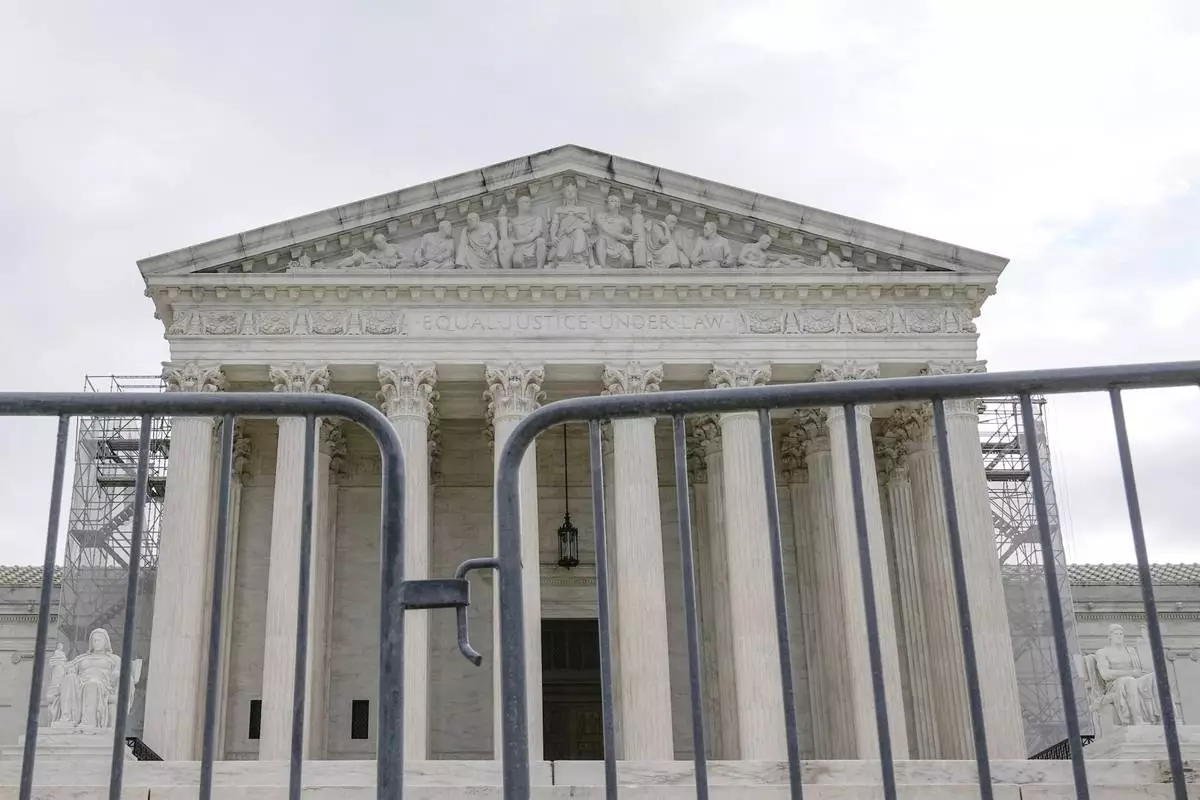
The Supreme Court is seen during a protest outside the as the justices prepare to hear arguments over whether Donald Trump is immune from prosecution in a case charging him with plotting to overturn the results of the 2020 presidential election, on Capitol Hill Thursday, April 25, 2024, in Washington. (AP Photo/Mariam Zuhaib)
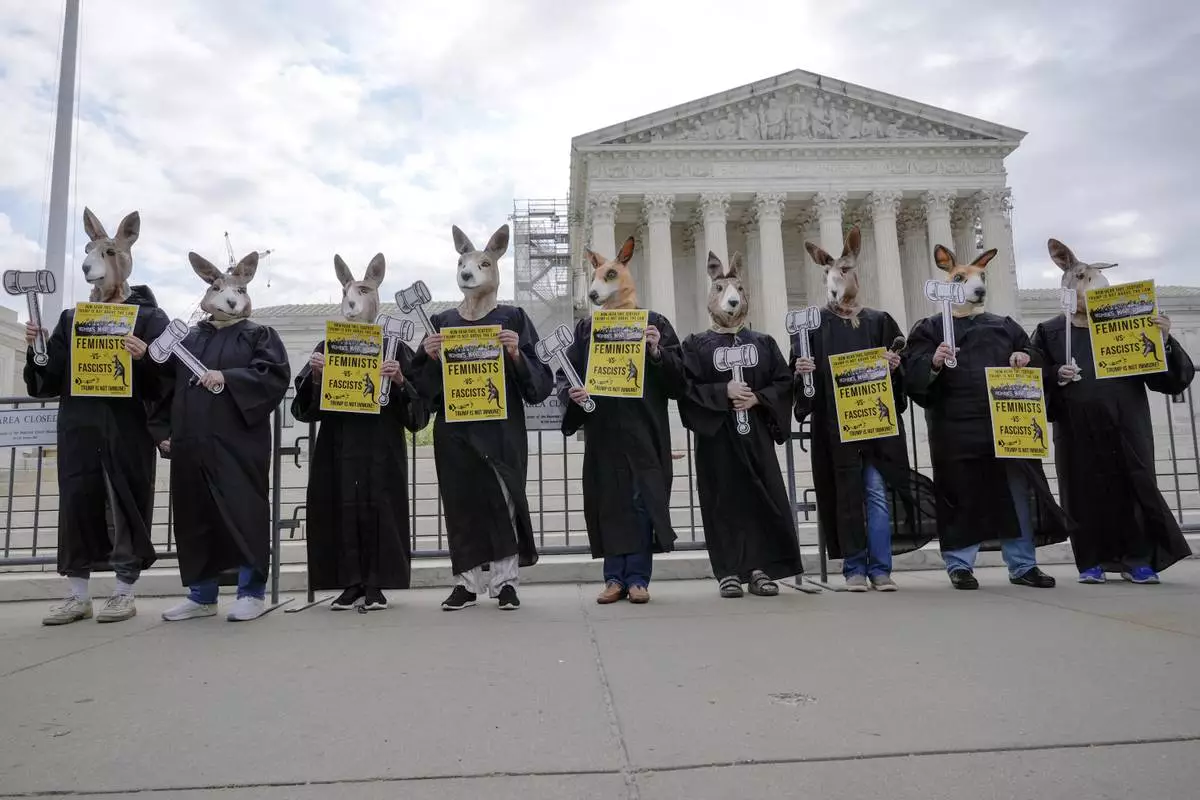
Demonstrators stand outside the Supreme Court as the justices prepare to hear arguments over whether Donald Trump is immune from prosecution in a case charging him with plotting to overturn the results of the 2020 presidential election, on Capitol Hill Thursday, April 25, 2024, in Washington. (AP Photo/Mariam Zuhaib)
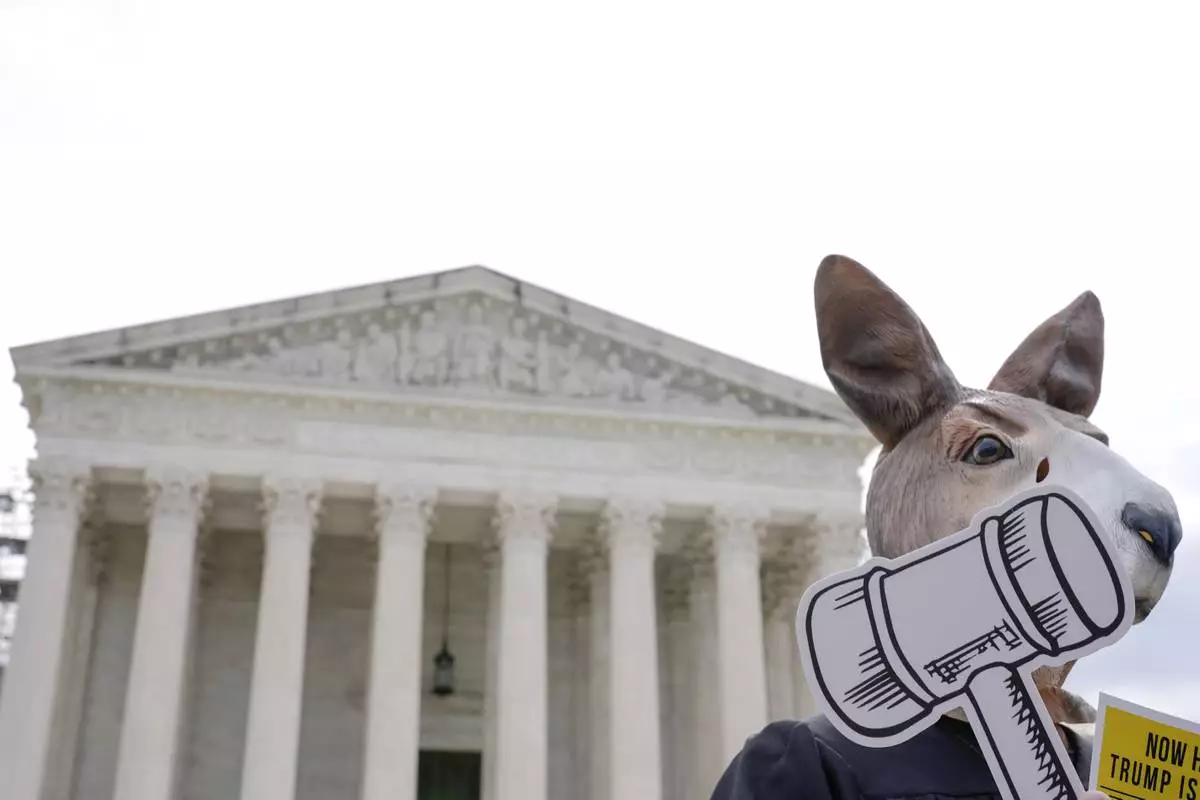
A demonstrator stands outside the Supreme Court as the justices prepare to hear arguments over whether Donald Trump is immune from prosecution in a case charging him with plotting to overturn the results of the 2020 presidential election, on Capitol Hill Thursday, April 25, 2024, in Washington. (AP Photo/Mariam Zuhaib)
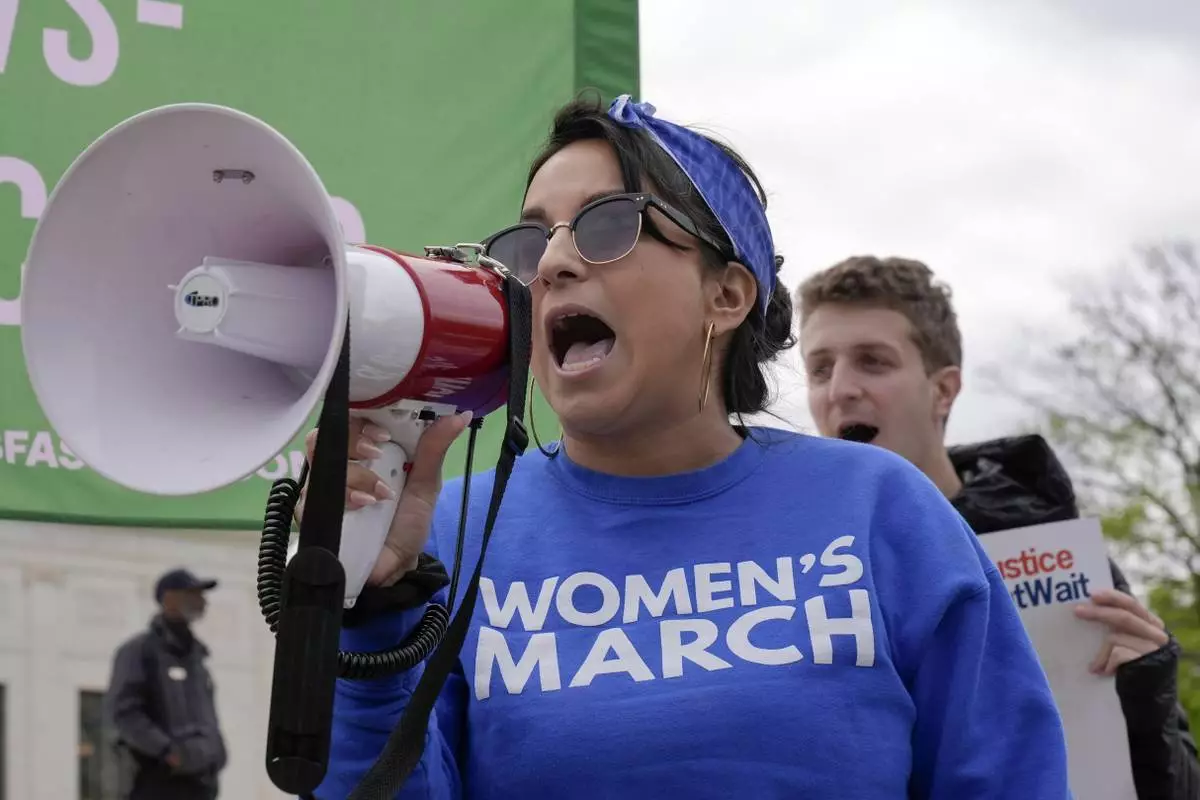
Demonstrators protest outside the Supreme Court as the justices prepare to hear arguments over whether Donald Trump is immune from prosecution in a case charging him with plotting to overturn the results of the 2020 presidential election, on Capitol Hill Thursday, April 25, 2024, in Washington. (AP Photo/Mariam Zuhaib)
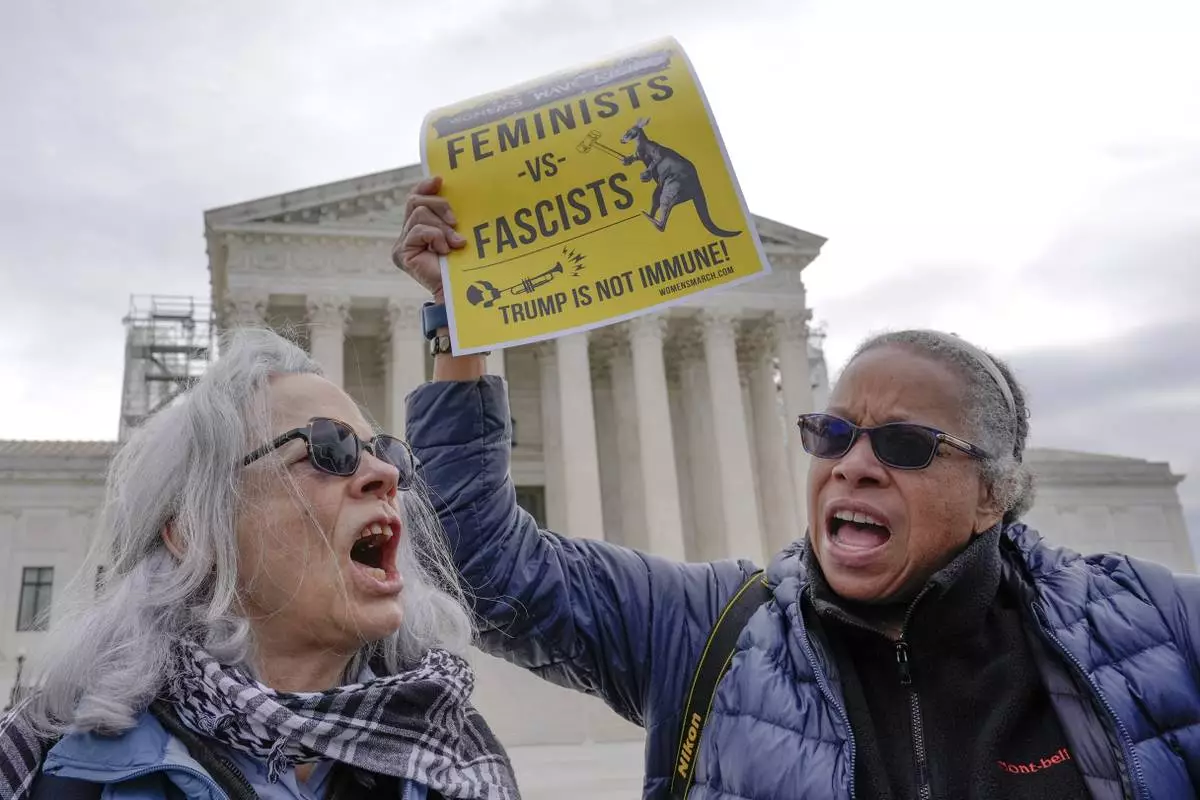
Demonstrators protest outside the Supreme Court as the justices prepare to hear arguments over whether Donald Trump is immune from prosecution in a case charging him with plotting to overturn the results of the 2020 presidential election, on Capitol Hill Thursday, April 25, 2024, in Washington. (AP Photo/Mariam Zuhaib)
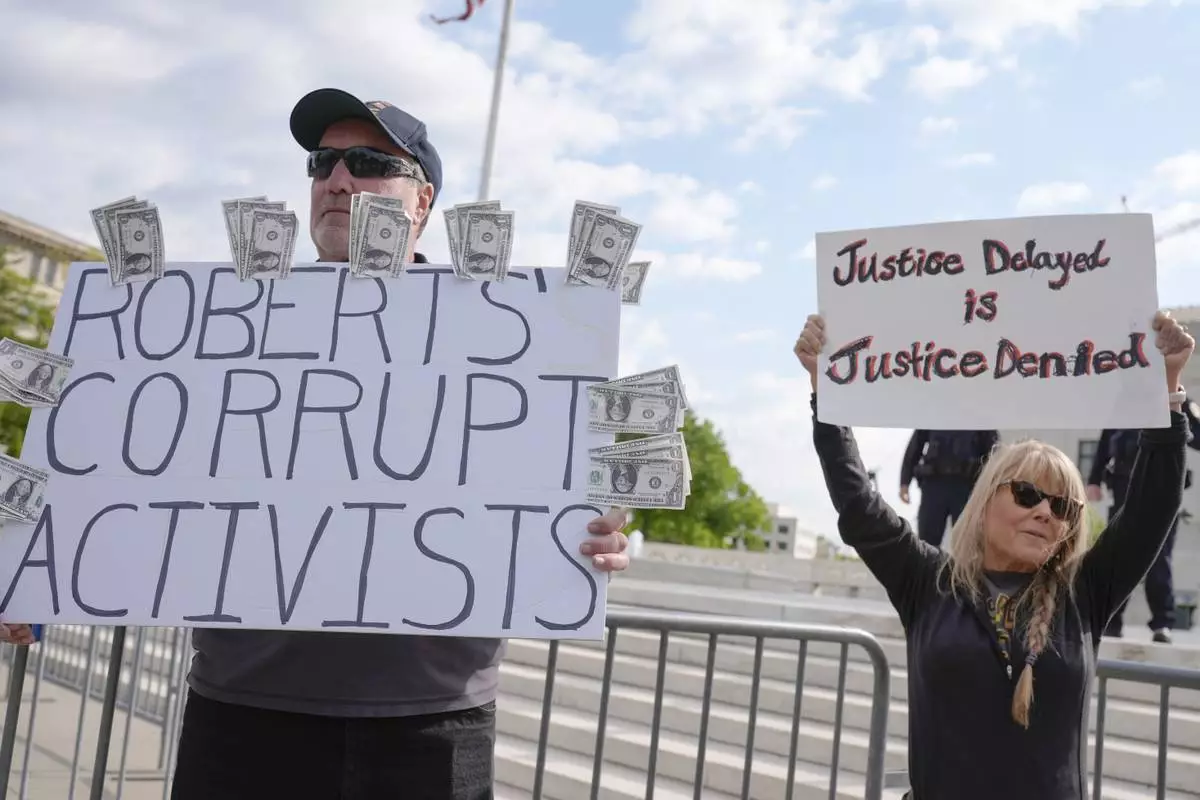
Demonstrates stand outside the Supreme Court as the justices prepare to hear arguments over whether Donald Trump is immune from prosecution in a case charging him with plotting to overturn the results of the 2020 presidential election, on Capitol Hill Thursday, April 25, 2024, in Washington. (AP Photo/Mariam Zuhaib)
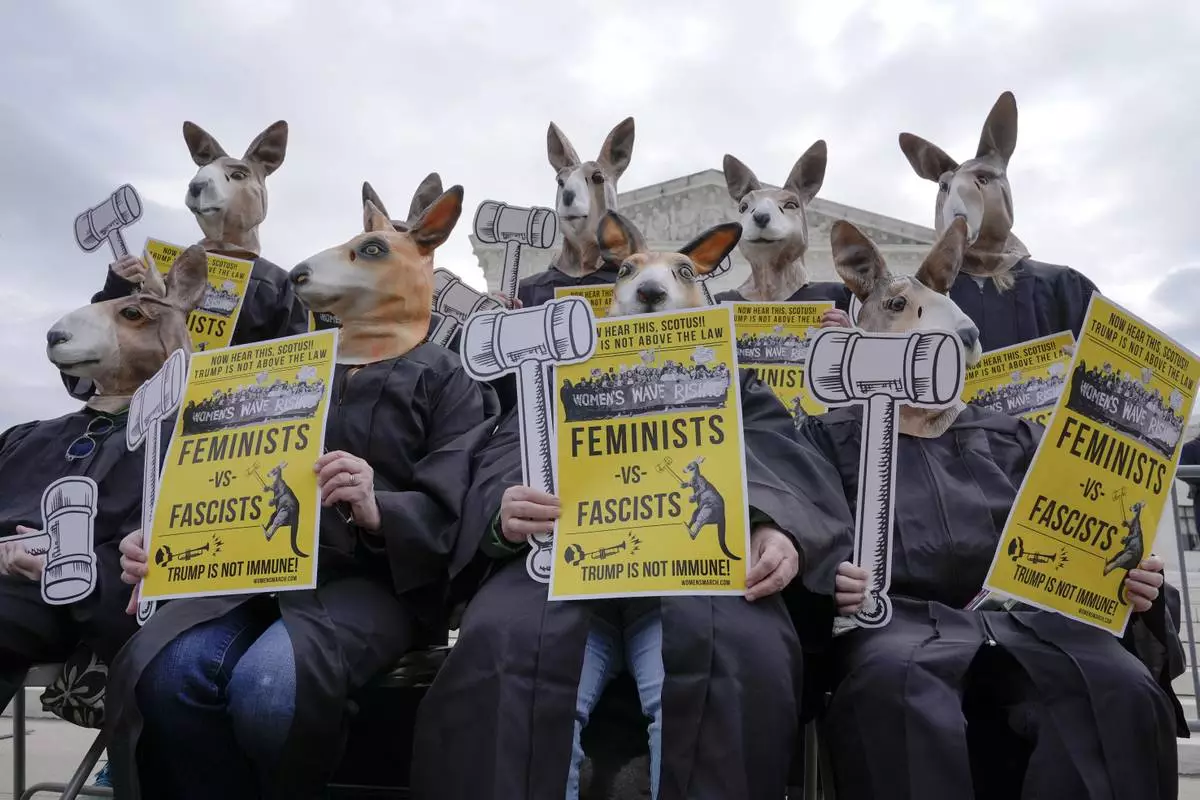
Demonstrates stand outside the Supreme Court as the justices prepare to hear arguments over whether Donald Trump is immune from prosecution in a case charging him with plotting to overturn the results of the 2020 presidential election, on Capitol Hill Thursday, April 25, 2024, in Washington. (AP Photo/Mariam Zuhaib)
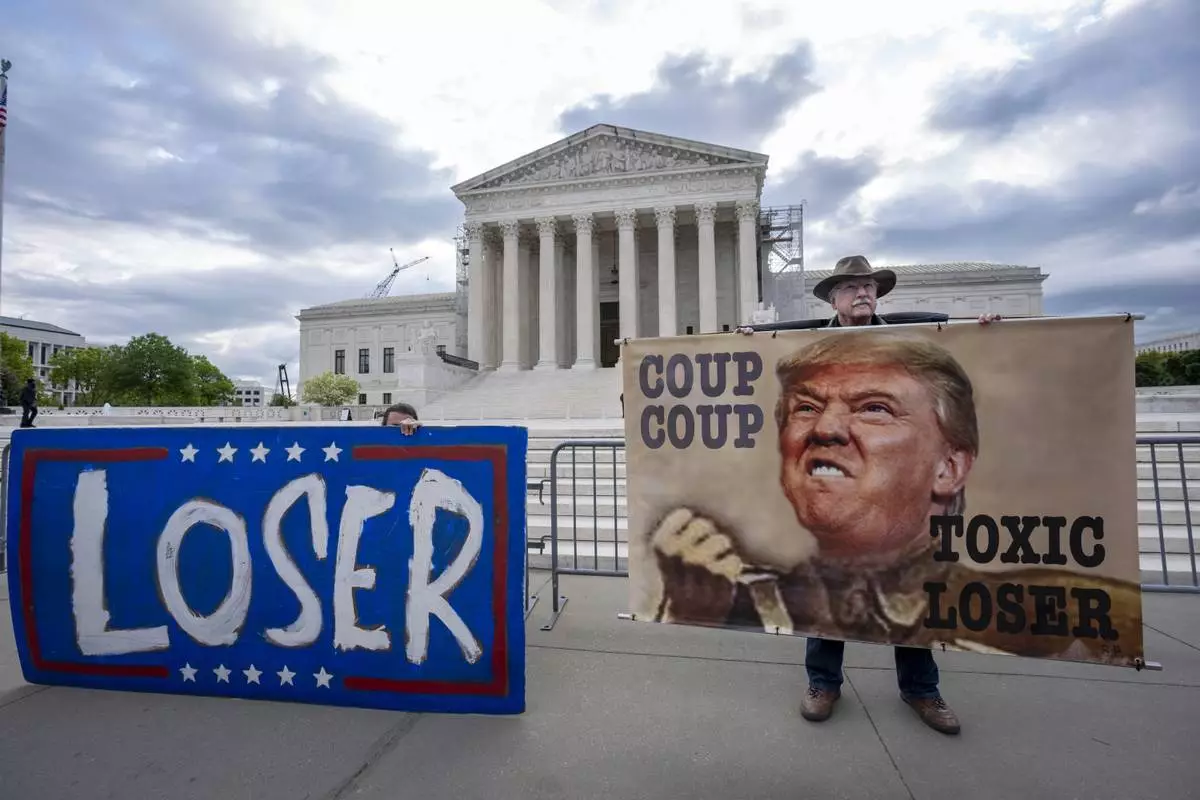
Activist Stephen Parlato of Boulder, Colo., right, joins other protesters outside the Supreme Court as the justices prepare to hear arguments over whether Donald Trump is immune from prosecution in a case charging him with plotting to overturn the results of the 2020 presidential election, on Capitol Hill in Washington, Thursday, April 25, 2024. (AP Photo/J. Scott Applewhite)
















